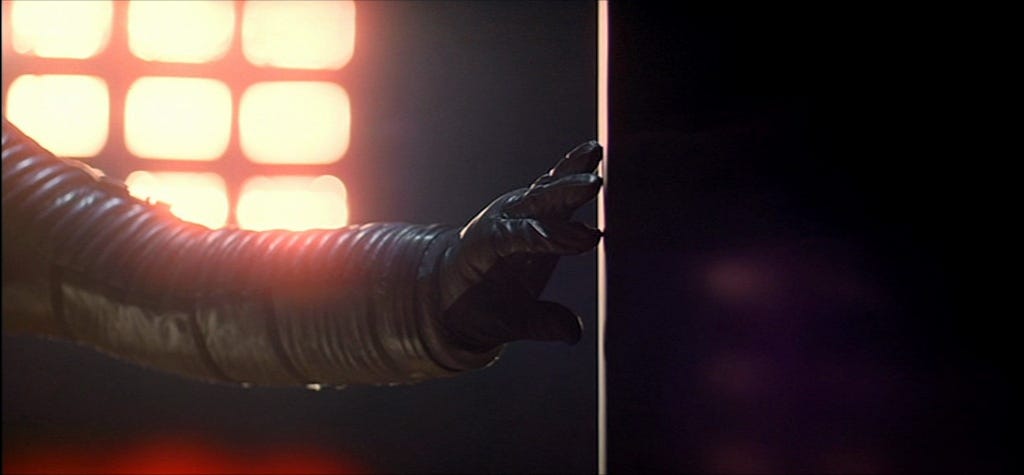6: Touching Infinity
Last night kicked off the Music Box Theatre’s semiannual 70mm Film Festival. My husband and I make a point of going to at least a couple screenings whenever the festival happens. The 70mm Film Festival never really happens at the same time every year; sometimes it’s in the spring, and sometimes it’s in the fall. I once saw Lawrence of Arabia at the festival at the end of summer when the theater’s AC had blown out—a memorable experience, if not really a fun one. We try to see something new every time, but we always see 2001: A Space Odyssey.
I have a history with 2001. I wrote about it a few years ago for Bright Wall/Dark Room: I’d hated the movie when my dad picked it for a family movie night when I was 12 or 13, then spent the next decade trying to square my identities as a science fiction nerd and a smart person with the slow realization that I hadn’t appreciated the movie in part because I hadn’t understood it. I knew I needed to see it again. For a few years I actually felt guilty about it.
When I finally did rewatch 2001, it was on a date with my now-husband on the giant screen at the Music Box in 70mm. It felt like I was watching the movie fresh for the first time; I couldn’t get over the vibrancy of the colors or the tiny details hidden at the edges of the frame. I’d learned to slow down as a moviegoer.
I’d also learned to loosen up and live with ambiguity. I no longer felt guilty about not understanding the movie; it’s more fun to revel in the details and colors of 2001 than it is to try to force the movie into a rigid box. I’ve also learned how to embrace repeat viewings with this one. Watching 2001 with an audience is always a fascinating experience, because you get a wide range of moviegoers under one roof, each bringing their own contexts and hang-ups to the movie. There’s always someone who performatively laughs to prove to the rest of the room that they Get It (these guys drive me nuts). There’s always a few people who don’t expect the Dawn of Man chapter, and a handful of people who get restless when the screen explodes into abstract color during the stargate sequence. My favorites are the audience members who have never seen the movie before, but who are invested, leaning forward in their seats, reaching toward the light on the big screen but unable to actually touch it.
My favorite sequence in the movie gets at this feeling. It’s the moment when the astronauts on the moon gather around the monolith they’ve unearthed. There’s no dialogue, only eerie choral music the swells louder and louder as the astronauts approach. They’re in silver space suits, little flecks of shiny metal against the matte black void of the slab they’re investigating. One of them approaches the slab and reaches out to touch it. The hard light reflecting off the surface looks like a barrier between the astronaut and the unknown void. He’s straining to fathom something he doesn’t even know exists yet. He’s touching infinity.

What I talked about:
This week’s episode of Seeing & Believing was a David Cronenberg double feature—we reviewed Crimes of the Future (2022) and The Fly (1986). I’d never seen a Cronenberg before, and I loved both of these movies; I’m also quite happy with the conversation Kevin and I had about them.
What I watched:
I saw Neptune Frost at the Gene Siskel Film Center this past weekend. I found the movie to be a little impenetrable in a layered sort of way: it’s a heady piece of afrofuturist science fiction filmed in Rwanda and Burundi, and I couldn’t tell if I couldn’t understand parts of it because of the technobabble-laced dialogue or the cultural barriers. The movie is anticolonialist and intentionally dense; it explicitly states that it’s not for the people in power. I love that it told me that it is Not For Me.
What I’m reading:
I’m tearing through Linda Holmes’ new book Flying Solo. I can’t quite tell if it’s a romantic book or a romance novel (the difference being whether the main character and the love interest are together at the end; if they’re together, it’s a romance, and if they’re not, it doesn’t count as part of the genre). Linda’s very good at writing the ambiguity that exists in normal human interactions. She’s also great at dialogue, and at writing about how it feels to be physically in a space with different people. None of it is self-conscious or precious. I’m going to miss spending time with these characters when the book is done.
Member discussion